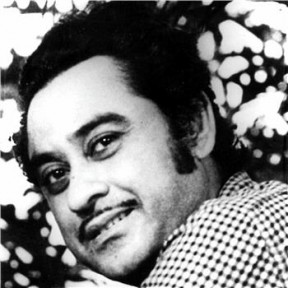On August 4, 1929, a voice was born. A voice of abandon, mischief, romance, barely contained madness, of rich, malted cadences. The voice that went by the name of Kishore Kumar. But then Abhas Kumar Ganguly or Kishore Kumar was more than just a gifted voice. He was an actor who could let himself loose before the camera as if it was winking at him and saying, “Go on. Go crazy. No one’s watching.” Watch him in Half Ticket (1962) doing Cheel Cheel Chilla Ke or wiggling in a fake beard and going ballistic with Din Jawani Ke Chaar Yaar Pyaar Kiye Jaa (1969), and you will know, this was not an actor of sober boundaries but someone who ran away with the envelop.
And yet in Hrishikesh Mukherjee’s wistful Musafir (1957), your heart went out to his earnest, unemployed character on the verge of a meltdown. And who can imagine Padosan (1968) without his behind-the-scene hysterics and songs like Ek Chatur Naar and Meri Pyari Bindu?
He was also a director who made Chalti Ka Naam Gaadi (1958), one of the finest comedies Hindi cinema has seen and one of the first films to celebrate the ‘bromance’ that contemporary films are taking credit for today. Two notable films he directed were the fun caper Jhumroo (1961) and the sensitive Door Gagan Ki Chhaon Mein(1964). He was a lyricist and a music director but most importantly a singer who went on from mimicking KL Saigal (yes really!) to Jimmie Rodger’s yodelling to becoming the definitive voice of Hindi film hero. Even if you don’t know which actor is singing Choodi Nahin Yeh Mera Dil Hai or Jiska Koi Nahin Usska Toh Khuda Hai Yaro or Yeh Jo Mohabbat Hai, Kishore Da’s voice will leave you in no doubt.
Kishore Da was probably the best comic talent in music and on film sets and no one can quite capture the madness of Aaake Seedhi Lagi (Half-Ticket) or even Pag Ghungroo Bandh Meera Nachi Thi (Namak Halal, 1982).It would not be far fetched to say that the genre of pure comic songs died with Kishore Kumar.
As did a certain level of playback singing that was individually brilliant but also seamlessly integral to a film’s sound track. Yes, Kishore Kumar was Kishore Kumar but he was also the voice of Dev Anand to Rajesh Khanna to Amitabh Bachchan and Rishi Kapoor and many generations of actors. It is easy to see just how he brought his talent as an actor to the recording studio and moulded his voice to suit the personality of the stars he was singing for.
My favourite Kishore Kumar songs are those that plumbed his depths and sounded like they had been dunked in darkness and light, soulfulness and heartbreak, pain and hope. Songs that caught him in a quieter, mellower mood. Yaadon Mein Woh (Swami), Maine Tumse Kuch Nahin Maanga (Katha), Badi Sooni Sooni Si Hai and Aaye Tum Yaad Mujhe (Mili), Bujha Do Deepak (Darpan), Jaane Kya Sochkar Nahin Guzra (Kinara), Chingari Koi Bhadke (Amar Prem), Tere Bina Zindagi Se (Aandhi), Hawaon Pe Likh Do (Do Dooni Chaar) and so many more.
And he was ofcourse, the romance of monsoons (Rim Jhim Gire Sawan in Manzil), sunlit meadows (Dil Kya Kare in Julie), surging oceans (Saagar Jaisi Ankhon Wali in Sagar), mist (O Hansini in Zehreela Insaan) and mountains and glades (Hamein Tumse Pyar Kitna in Kudrat). His voice could be soft like a whisper (Dil, Hai Mera Dil in Paraya Dhan), powerful like a mountain stream (Ban Ke Nazar in Aasman), haunting like an echo coursing through a forest (Dilruba Aa in Yahi Hai Zindagi) and on and on. For someone who was never trained classically to have this range is miraculous but also the result of great passion for perfection, be it in emotive expression, intonation or pitch and timbre. This was a man who had this great inexhaustible talent for music and yet reconciled it somehow with his almost legendary eccentricity and a tumultuous personal life.
The era of playback singing tailored to a certain context and yet rising above it, ended with Kishore Kumar. Today film music is mostly a soundtrack in isolation, a disjointed collection of songs that have nothing in common with each other or anything to do with the story. That is why when you hear songs from Amar Prem, Sharmilee, Aradhana, Mili, Muqaddar Ka Sikandar and many more, you realise that Kishore Kumar was not just a singer but the purveyor of a million stories and emotions that come rushing back whenever he sings in our memory or when just a snatch of Aane Wala Pal lingers on for an eternity. Like someone posted on Facebook today, “Happy Birthday Kishore Da, we are glad you were ours.”
Reema Moudgil is the author of Perfect Eight (http://www.flipkart.com/b/books/perfect-eight-reema-moudgil-book-9380032870?affid=unboxedwri )






